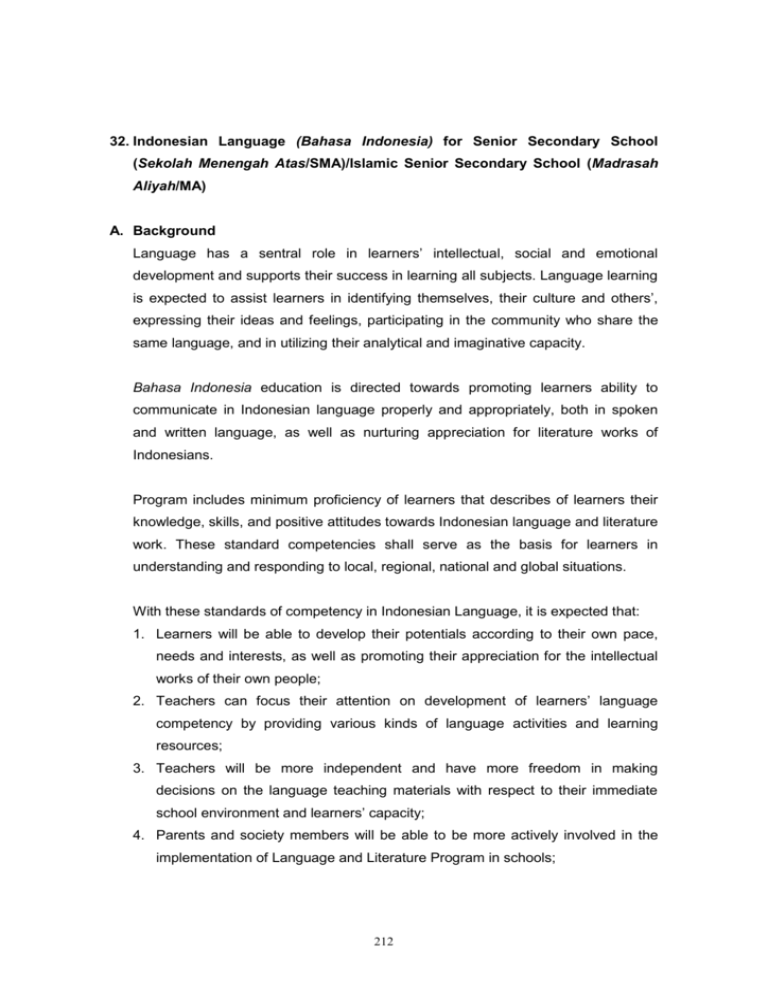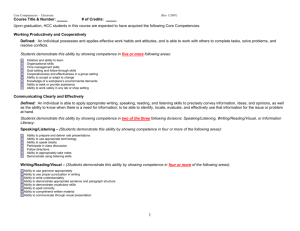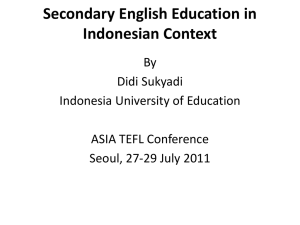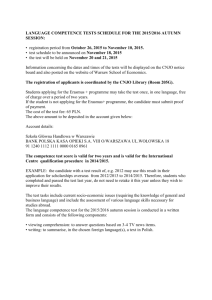D. Standard of Competence and Basic Competence
advertisement

32. Indonesian Language (Bahasa Indonesia) for Senior Secondary School (Sekolah Menengah Atas/SMA)/Islamic Senior Secondary School (Madrasah Aliyah/MA) A. Background Language has a sentral role in learners’ intellectual, social and emotional development and supports their success in learning all subjects. Language learning is expected to assist learners in identifying themselves, their culture and others’, expressing their ideas and feelings, participating in the community who share the same language, and in utilizing their analytical and imaginative capacity. Bahasa Indonesia education is directed towards promoting learners ability to communicate in Indonesian language properly and appropriately, both in spoken and written language, as well as nurturing appreciation for literature works of Indonesians. Program includes minimum proficiency of learners that describes of learners their knowledge, skills, and positive attitudes towards Indonesian language and literature work. These standard competencies shall serve as the basis for learners in understanding and responding to local, regional, national and global situations. With these standards of competency in Indonesian Language, it is expected that: 1. Learners will be able to develop their potentials according to their own pace, needs and interests, as well as promoting their appreciation for the intellectual works of their own people; 2. Teachers can focus their attention on development of learners’ language competency by providing various kinds of language activities and learning resources; 3. Teachers will be more independent and have more freedom in making decisions on the language teaching materials with respect to their immediate school environment and learners’ capacity; 4. Parents and society members will be able to be more actively involved in the implementation of Language and Literature Program in schools; 212 5. Schools can develop their own Language Education Program with respect to the condition of their respective learners and available learning resources; 6. Regions can decide on the language learning materials and resources with respect to their respective conditions and characteristics without disregarding national interests. B. Objectives The Indonesian Language subject aims at providing students with the following competencies: 1. To communicate effectively and efficiently with regards to existing ethics, both in spoken and written language; 2. To appreciate and have proud in the use of Indonesian as the national and unifying language; 3. Comprehend Indonesian language and use it appropriately and creatively for various purposes; 4. To use Indonesian language to promote intellectual capacity and emotional and social maturity; 5. To enjoy and make the best use of literature works for widening their general views, refining their characters, and promoting intellectual and language proficiency; 6. To appreciate and be proud of Indonesian literature as a repertoire of Indonesians’ culture and intellectual. C. Scope The scope of Indonesian Language subject includes the components of language and literature skills that consist of the following aspects: 1. Listening 2. Speaking 3. Reading 4. Writing By the end of SMA/MA Program, learners will have read at least 15 (fifteen) fiction and non fiction books. 213 D. Standard of Competence and Basic Competence Year X, 1st Semester Standard of Competence Basic Competence Listening 1. Understanding 1.1 Responding to broadcasted program or broadcasted program or information in electronic media (news and non- stories presented live/ news) recorded 1.2 Identifying literature elements (intrinsic and extrinsic) of a story delivered live/recorded Speaking 2. Expressing thoughts, feelings, and information through introduction, discussion and storytelling 2.1 Introducing oneself and others in a formal context with proper intonation 2.2 Discussing problemd (found in various news items, articles, or books) 2.3 Sharing various kinds of experience with proper choice of words and expressions Reading 3. Comprehending various non fiction reading texts using different reading techniques/strategies 3.1 Identifying main ideas of various non fiction texts using speed reading (250 word per minute) 3.2 Identifying ideas of non fiction texts from various sources using extensive reading strategies Writing 4. Expressing information in various types of paragraphs (descriptive, narrative, and expository) 4.1 Presenting ideas in sequence of time and place in the form of narative paragraphs 4.2 Writing results of observation in descriptive paragraphs 4.3 Presenting ideas logically and systematically in expsitory pragraphs Listening 5. Understanding poems delivered in live/recorded mode 5.1 Identifying form elements of a poem delivered in live/recorded mode 5.2 Revealing content of a poem delivered in live/recorded mode 214 Standard of Competence Basic Competence Speaking 6. Analyzing short-stories through discussion activities 6.1 Identifying interesting or impressive points of a short-story through discussion activities 6.2 Identifying values of a short-story through discussion activities Reading 7. Understanding literature texts through poetry and short-story readings 7.1 Reading poems with proper pronunciation, tone, stress and intonation 7.2 Analyzing relevance of intrinsic elements of a short story to the real life Writing 8. Expressing thoughts and feelings in poem writing activities 8.1 Rewriting poems with special attention on verses, rhythm and rhyme 8.2 Writing new poems with special attention on verses, rhythm and rhyme 215 Year X, 2nd Semester Standard of Competence Basic Competence Listening 9. Understanding information in utterances 9.1 Making conclusion on information content of direct utterances Making conclusion on information content of indirect utterances (recorded or read-out texts) Speaking 10. Expressing comments on information obtained from varied sources 10.1 Expressing critique on information found in printed or electronic media 10.2 Expressing agreement/support for articles found in printed or electronic media Reading 11. Understanding varied types of texts by scanning 11.1 Scanning texts/books to summarize the whole information into several sentences 11.2 Scanning tables and/or graphs to summarize the whole information into several sentences Writing 12. Expressing information in paragraphs and speech texts 12.1 Writing argumentative paragraphs to express ideas in support of an opinion 12.2 Writing persuasive paragraphs to express ideas to convince or persuade readers to take position/action 12.3 Writing report of interview into several paragraphs with correct spelling 12.4 Writing up text for a speech Listening 13. Understanding folk stories being told 13.1 Identifying interesting things in characters in folk stories being presented in live or recorded mode 13.2 Explaining interesting things in the background setting of folk stories being presented in live or recorded mode 216 Standard of Competence Basic Competence Speaking 14. Expressing opinion on 14.1 Discussing content of poems in relation to poems in discussion description of sense, feelings, thoughts and activities imagination in discussion activities 14.2 Relating/linking content of poems into reality in nature, social, culture and community in discussion activities Reading 15. Understanding classical Malay literature 15.1 Identifying characteristics and structure of intrinsic elements in classical Malay literature 15.2 Identifying values contained in classical Malay literature Writing 16. Expressing own 16.1 Writing compositions based on own life story experience and others’ in (characters, events, setting) in the form of the form of short stories short story 16.2 Writing compositions based on other people’s life story (characters, events, setting) in the form of short story 217 Year XI, 1st Semester Standard of Competence Basic Competence Listening 1. Comprehending information in speech/lecture and 1.1 Identifying main ideas of speech/lecture and interviews being attended 1.2 Summarizing content of talks in interviews interviews Speaking 2. Presenting, orally, information obtained from reading and interviews 2.1 Presenting, orally, analysis of a specific topic as results of article or book reading activity 2.2 Presenting, orally, results of interview on interviewee’s response to particular topic Reading 3. Comprehending varied 3.1 Identifying differences between inductive and types of written texts by deductive paragraphs through intensive reading performing intensive activities reading and reading aloud 3.2 Reading out news items with proper intonation, pronunciation and reading pose Writing 4. Presenting information in the form of proposal, business letters, papers 4.1 Writing proposal for various needs 4.2 Writing business letters and letter of auathorization 4.3 Completing papers with list of references and foot-notes Listening 5. Understanding drama performance 5.1 Identifying event, characters and their characteristics, dialogs and conflicts in a drama performance 5.2 Analyzing a drama performance based on techniques of presenting 218 Standard of Competence Basic Competence Speaking 6. Taking up a character role in a drama performance 6.1 Acting out dialog with body language and gestures that fit the character being presented 6.2 Presenting behavior and dialog of a protagonist or antagonist character Reading 7. Understanding varied Indonesian or translated tales and novels 7.1 Identifying intrinsic and extrinsic elements in tales 7.2 Analysis of intrinsic and extrinsic elements Indonesian/translated novels Writing 8. Presenting information in the form of review 8.1 Presenting principles of review writing 8.2 Applying principles of review writing Year XI, 2nd Semester Standard of Competence Basic Competence Listening 9. Understanding opinion and information from varied sources in discussion or seminar 9.1 Summarizing content of talks in a discussion or seminar 9.2 Commenting on other’s opinion in a discussion or seminar Speaking 10. Presenting, orally, a research report in a discussion or seminar 10.1 Presenting findings of a research study coherently in proper and appropriate language 10.2 Commenting others’ responses on presentation of a research report Reading 11. Comprehending varied written texts through speed and intensive reading 11.1 Presenting main points of texts after reading them at 300 word per minute 11.2 Distinguishing facts from opinions found in editorial through intensive reading 219 Standard of Competence Basic Competence Writing 12. Presenting information in the form of summaries, minutes of meeting, and papers 12.1 Writing summary of a book 12.2 Writing minute of meeting according to proper format 12.3 Writing papers based on results of observation and research studies Listening 13. Comprehending shortstory reading 13.1 Identifying the plot, character and setting in a read-out short story 13.2 Identifying values in a a read-out short story Speaking 14. Presenting literature texts in the form of drama performance 14.1 Acting out dialogs of characters in a drama performance 14.2 Performing body language, facial expressions and intonation suitable to the related character in a drama performance Reading 15. Comprehending biographies, novels, and tales 15.1 Presenting interesting things good models of the character in question 15.2 Comparing intrinsic and extrinsic elements in Indonesian/translated novels and tales Writing 16. Writing drama/play script 16.1 Describing people’s behavior by means of drama/play script 16.2 Narrating human’s experience in the form of scenes and setting in a drama/play script 220 Year XII, 1st Semester Standard of Competence Basic Competence Listening 1. Understanding information in varied reports 1.1 Distinguishing facts from opinions presented in varied spoken reports 1.2 Commenting on varied spoken reports by providing review and recommendation Speaking 2. Expressing ideas, 2.1 Expressing ideas and responses that are responses and supported by logical reasons in a discussion information in a 2.2 Presenting summary of a non fiction book using discussion effective language in a discussion Reading 3. Comprehending articles and texts of speech 3.1 Identifying main issues in articles through intensive reading activities 3.2 Reading aloud text of speech with correct intonation Writing 4. Presenting information in the form of official letters, reports, and review 4.1 Writing job application letter with relevant elements and structure 4.2 Writing official letters in standard content, language and format 4.3 Writing report of discussion by enclosing minutes and list of participants 4.4 Writing review of scientific textbook in standard format Listening 5. Understanding a novel reading Responding to novel excerpts reading in relation to vocal, intonation and comprehension aspects Explaining intrinsic elements in read-out novel excerpts 221 Standard of Competence Basic Competence Speaking 6. Expressing opinions on poetry readings 6.1 Responding to old-poetry reading in terms of correctness of pronunciation, intonation and expressions 6.2 Commenting on new-poetry reading in terms of correctness of pronunciation, intonation and expressions Reading 7. Understanding poems 7.1 Reading out own poems with appropriate and short stories as pronunciation, intonation, comprehension and literature texts expression 7.2 Explaining intrinsic elements of a short story Writing 8. Expressing opinions, information and experience in the form of review and short story 8.1 Writing review of a short-story compilation work based on elements of review 8.2 Writing short story based on other’s life experience (character, event, setting) 222 Year XII, 2nd Semester Standard of Competence Basic Competence Listening 9. Understanding information from varied sources presented orally 9.1 Recommending revision on information presented orally 9.2 Recommending revision on information presented on radio/TV Speaking 10. Delivering information through program/ 10.1 Presenting program/proposal 10.2 Delivering a speech without text guidance and proposal presentation with appropriate pronunciation, intonation, without text guidance tone and attitude Reading 11. Comprehending varied written texts through speed and intensive reading activities 11.1 Identifying main ideas of texts with a reading speed of 300-350 word per minute 11.2 Identifying the main-idea sentences of varied patterns of inductive and deductive paragraphs by intensive reading activities Writing 12 Expressing thoughts, 12.1 Writing composition on a specific topic using opinions and information deductive and inductive pattern of paragraph in patterned development compositions 12.2 Writing essay on a specific topic which development follows introduction-discussionclosing pattern 223 Standard of Competence Basic Competence Listening 13 Understanding drama 13.1 identifying intrinsic elements in drama script script reading being read-out 13.2 Driving conclusion on the content of a drama through drama script reading Speaking 14 Presenting response on 14.1 Analyzing characteristics and values contained old-poetry reading in gurindam 14.2 Explaining relationship between gurindam and daily life Reading 15 Comprehending 15.1 Identifying theme and characteristics of anthology of contemporary poetry through reading activities contemporary poetry of anthology of contemporary poetry considered outstanding 15.2 Identifying differences in the characteristics of of each period each poetry generation by reading poetry considered outstanding of each period Writing 16 Expressing opinions in 16.1 Understanding the principles of critiques and the form of critique and essay essay writing 16.2 Applying the principles of critiques and essay writing in commenting on literature works E. Direction of Development Standard and basic competencies provide direction and basis for development of core materials, learning activities, and achievement indicators of competencies in assessment. In designing learning and assessment activities, it is necessary to consider Standards of Process and Standards of Assessment. 224






